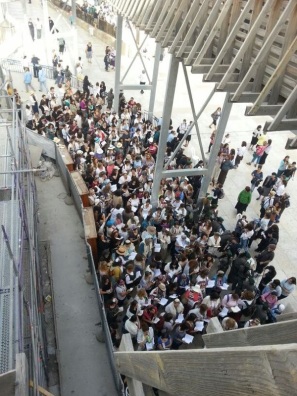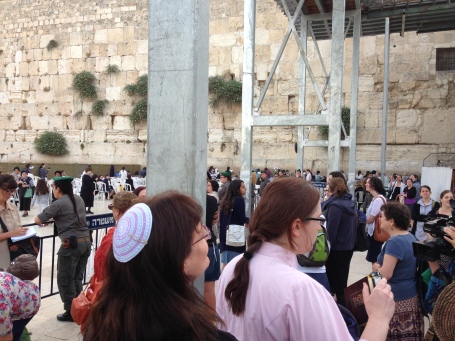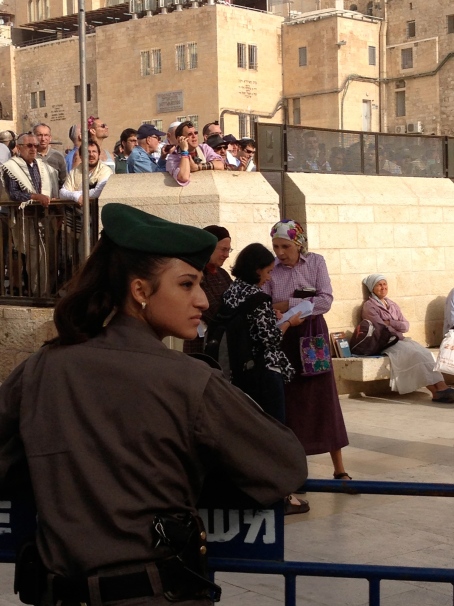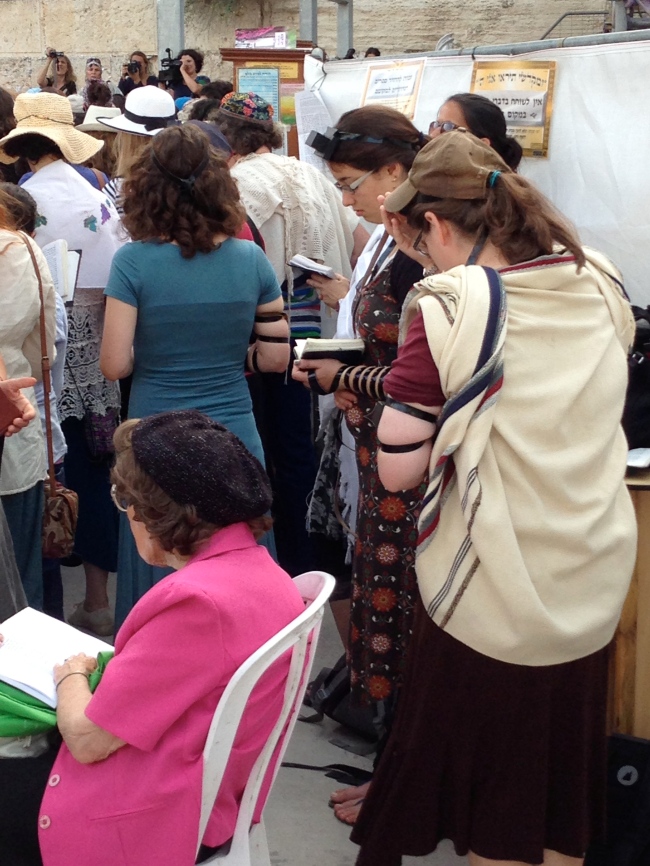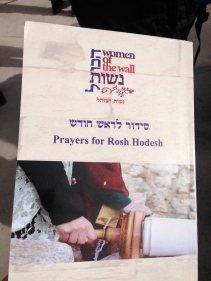
It was with mixed feelings that on Sunday 9th June, I woke up at 5.30am in Jerusalem and walked to a meeting point outside the Old City, where I was met by a group of men, women and policemen in order to travel by coach to the Kotel, the Western Wall, escorted by sirens and police to pray morning prayers.
For the past week, I have been on a human rights fellowship trip with Rene Cassin, a Jewish human rights charity based in the UK. A group of 10 UK, 10 USA and 10 Israeli young professionals have been studying about human rights and international law for the past few months and we were all in Israel to look into human rights issues in the country we all know and love.
I had been following the news about the controversial group of women who come together every Rosh Chodesh, the first day of the Jewish month, to pray at the Western Wall wearing tefillin and tallitot. These Jewish symbols are traditionally only worn by men, and have therefore been the cause of much controversy. The prayer sessions at the Kotel each month have degenerated into violent protests by the Ultra Orthodox community, who feel that the women are violating Jewish tradition and practice.
In actuality, although women are not obligated in time bound commandments, such as wearing tefillin and tallit, many commentators suggest that women may participate in the commandments if they wish to. Maimonides writes “so too all positive mitzvot brought on by time that women are exempt from, if they wish to do them without making a blessing, we do not hinder [them].” (Maimonides Mishnah Torah Laws of Tsitisit 3:9).This is a general truth about mitzvot, that one who is not obligated to do a mitzvah may still perform that mitzvah provided there is no explicit statement otherwise.
So why have the Women of the Wall caused such an uproar in their attempt to connect to G-d and pray in the way in which they are accustomed to?
It seems that there are larger forces at play here. The friction over the Women of the Wall group is symbolic of a widespread tension between Jewish sects all over the world. Often I have witnessed ill feeling between Orthodox and Reform communities, between Modern Orthodox and Ultra Orthodox, between Conservative and Liberal communities. Why is it that Jews cannot overcome barriers and embrace the similarities we all share in our love for our faith? When did intra-faith tension become almost more of an issue than interfaith tension? Historically, Jewish fear of the other has come in the form of uneasiness towards other faiths and beliefs. Yet during Sunday morning’s prayers, a group of Indian ladies wearing saris walked past the protesters and the women of the wall, straight to the Western Wall to pray. And not one person blinked, shouted abuse or threw eggs. Is this true progress when instead of turning against another faith, we turn against ourselves?
As I walked through the barrier towards the Kotel, through a line of armed police and into the enclosure provided for the Women of the Wall, I could hear chanting from the Orthodox protesters, although I could not see them through the fence. Behind me, a few women started singing passionately in Hebrew, tunes which took me back to my childhood. Tunes I have been hearing all my life and have always associated with positive and happy Judaism. I could not help but think back to my visit to Poland on a school trip a few years ago, singing Hebrew songs with my peers as we walked through a different kind of fence, through a very different scenery. As Jews, we know very well what happens when intolerance meets extremism.
The tense atmosphere increased as more and more women gathered and the prayers started. It was almost amusing that as the women’s prayers became louder, from the other side of the mechitza, I could hear the men attempt to compete in a song war reminiscent of a youth movement camp. Who will sing the loudest and shout the strongest?!
Most of the Orthodox women watched the Women of the Wall in silence, some sniggering at the strange sight of women wearing traditional men’s garb, some even taking photos, whilst others felt it necessary to walk past and yell abuse at the women. ‘You trouser-wearing women, go to a Church, you are not Jewish’, ‘let the police do their real jobs’ and ‘you are not wanted here, you are ruining our men’s prayers’.
The Kotel has always been a place of peace and serenity for me. A place to gather my thoughts and put my life in perspective.
Last Sunday, all I felt was an overwhelming sense of sadness. Is this really what Judaism has become? For the first time in a long time, I prayed. I prayed for tolerance and respect to seep through to the gathering crowds. I prayed for greater understanding of ‘the other’, on all sides.
And I prayed for Jews all over the world to have the strength to not become threatened by difference and change. Regardless of people’s personal opinions of the Women of the Wall, I feel strongly that change, even if only to the extent of attitudinal change, must come with respect and tolerance. After all, “Progress is impossible without change, and those who cannot change their minds cannot change anything”. (George Bernard Shaw).
